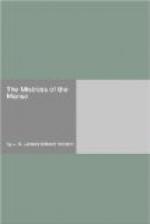Turns with aversion from the breeze,
And stretches all its stunted limbs
Landward and heavenward, toward the trees
That listen to a thousand hymns,
And grow to grander destinies.
Man may not live on whitest loaves,
With all of coarser good dismissed;
He pines and starves who never roves
Beyond the holy eucharist,
To gather of the fields and groves.
And he who seeks to fill his heart
With solace of a single friend,
Will find refreshment but in part,
Or, sadder still, will find the end
Of all his reach of thought and art.
They who love best need friendship most;
Hearts only thrive on varied good;
And he who gathers from a host
Of friendly hearts his daily food,
Is the best friend that we can boast.
She left her husband with his friends;
She called them round him at her board;
And found their culture made amends
For all the time that, from her hoard,
She spared him for these nobler ends.
He was her lover; that sufficed:
His home was in the Holy Place
With that of the Beloved Christ;
And friendship had no subtle grace
By which his love could be enticed.
Of all his friends, she was but one:
She held with them a common field.
Exclusive right, with love begun,
Ended with love, and stood repealed,
Leaving his friendship free to run
Toward man or woman, all unmissed.
She knew she had no right to bind
His friendship to her single wrist,
So long as love was true and kind,
And made her its monopolist,
No time was grudged with jealous greed
Which either books or friendship claimed.
He was her friend, and she had need
Of all—unhindered and unblamed
That he could win, through word or deed.
Her friend waxed great as grew the man;
Her temple swelled as rose her priest—
With power to bless and right to ban—
And all who served him, most or least,—
From chorister and sacristan
To those whose frankincense and myrrh
Perfumed the sacred courts with alms,—
Were gracious ministers to her,
Who found the largess in her palms,
And him the friendly almoner.
LOVE’S CONSUMMATIONS.
The summer passed, the autumn came;
The world swung over toward the night;
The forests robed themselves in flame,
Then faded slowly into white;
And set within a crystal frame
Of frozen streams, the shaggy boles
Of oak and elm, with leafless crowns,
Were painted stark upon the knolls;
And cots and villages and towns
On virgin canvas glowed like coals
In tawny-red, or strove in vain
To shame the white in which they stood.
The fairest tint was but a stain
Upon the snow, that quenched the wood,
And paved the street, and draped the plain!




